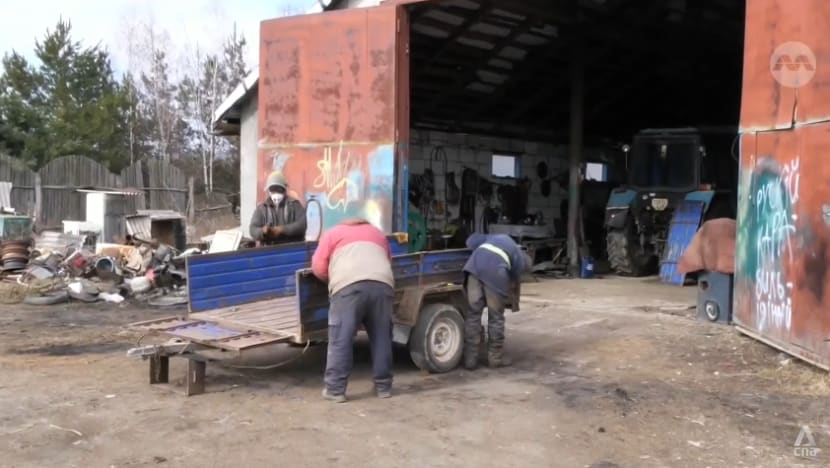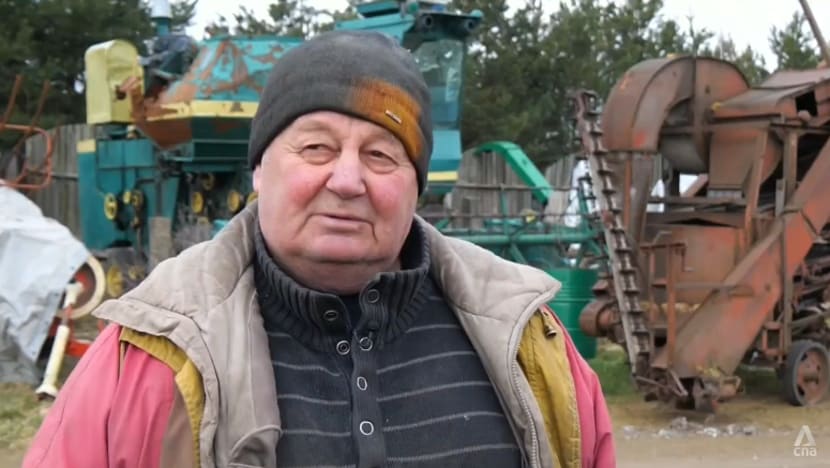‘Everything had burned down’: Ukrainian farmers devastated by war with Russia
The economic toll from Russia’s invasion that triggered major disruptions to production and exports, particularly of grain, has been felt globally.

Ukrainian farmer Ivan Mishchenko fixes broken equipment at his farm in Kyiv Oblast.
KYIV OBLAST: Among broken farming machinery, rocket fragments are scattered across the fields belonging to Ukrainian farmer Ivan Mishchenko.
The 66-year-old fled his farm in March last year when the fighting between Ukrainian and Russian forces reached his doorstep.
He continued keeping tabs on his property by phoning his neighbours.
“I kept calling and asking ‘Is everything okay with my house?’ They said it was fine, it was all good... But then around March 26, they told me that my farm was constantly on fire and everything had burned down,” he told CNA.

Mr Mishchenko’s family farm in the Kyiv Oblast region of north-central Ukraine was built from the ground up over the span of 30 years, but was decimated in just a matter of weeks.
When he finally returned home, he found his house and barns badly damaged, with landmines planted across his fields.
“We walked through the fields, saw where the mines were and found a lot of explosive devices, both exploded and unexploded. There were many missiles,” he said.
“The field was so badly damaged that my car nearly overturned in the craters several times.”
Mr Mishchenko’s son-in-law was killed shortly after the start of Russia’s full-scale invasion of his country last February.
By late March and early April, Russian forces had withdrawn from the region surrounding the capital Kyiv, after little progress and heavy losses.
But nearly a year later, the scars of war are still visible, and communities are struggling to rebuild.
Farmers in the area said they lost around 40 cows and 100 pigs due to Russian rockets and mines, and damages amount up to hundreds of thousands of dollars.
Beyond the cost in human lives, the war has also caused economic devastation.
ECONOMIC TOLL ON AGRICULTURE
Ukraine has historically played a major role in producing food for nations around the world.
The economic toll from the conflict that triggered major disruptions to production and exports – particularly of grain – has been felt globally.
Before the invasion, farming accounted for more than 10 per cent of Ukraine’s gross domestic product. The nation exported around six million tonnes of grain per month.
By the spring of 2022, United Nations (UN) officials said that grain exports had plummeted to less than one million tonnes.
With ports blocked, Ukraine’s grain had nowhere to go. That sent global wheat prices soaring by more than 50 per cent.
The UN said it assisted in building six million tonnes of storage capacity to help farmers store their grain while efforts were underway to get exports moving.

“All the objectives in the last year were to re-increase the exports via the dry land – what we call the dry port – throughout Europe, and also to try and have an agreement – the Black Sea Grain Initiative – in order to export by sea,” said Mr Pierre Vauthier, head of the Ukraine office at the UN’s Food and Agriculture Organization.
UKRAINE’S EXPORTS FACE UNCERTAIN FUTURE
The deal, brokered in July last year, allows Ukraine to export grain and other agricultural products from Black Sea ports.
More than 23 million tonnes of foodstuffs had been shipped from Ukraine since, and helped stabilise global food markets.
However, the deal is set to expire on Mar 18 this year. Ukraine and the UN have called for a one-year extension, with UN chief Antonio Guterres stressing the initiative’s importance to global food security and food prices.
UN World Food Programme economist Friederike Greb said: “Anything that helps get these grains and foodstuffs into global markets helps bring prices down and ease the supply situation.
“The Black Sea Grain Initiative has done just that and it has been very successful, looking at the quantities that have been exported.”
DIFFICULT SITUATION FOR FARMERS
But even if all parties agree to an extension, the war continues to impact Ukraine’s agricultural sector and conditions on the ground remain difficult for many farmers.
Grain exports for the 2022/23 growing season are down around 30 per cent compared to the season before.
Some farmers are not keen to produce as they are unsure of what exactly can be exported under the deal, amid bleak and uncertain circumstances in the ongoing war.
“The price of fertilisers, herbicides, seeds … are very important. On top of that, there's also a number of agricultural lands that aren’t accessible anymore,” said Mr Vauthier.
A report last June from the Kyiv School of Economics showed that Ukraine has suffered US$4.3 billion in damage to farmland, machinery and livestock as a result of the conflict.
For farmer Mr Mishchenko, he has started clearing debris from his fields and fixing his structures and machines.
He said resiliency is in his roots and has vowed to rebuild his family farm so that crops can grow again.

















